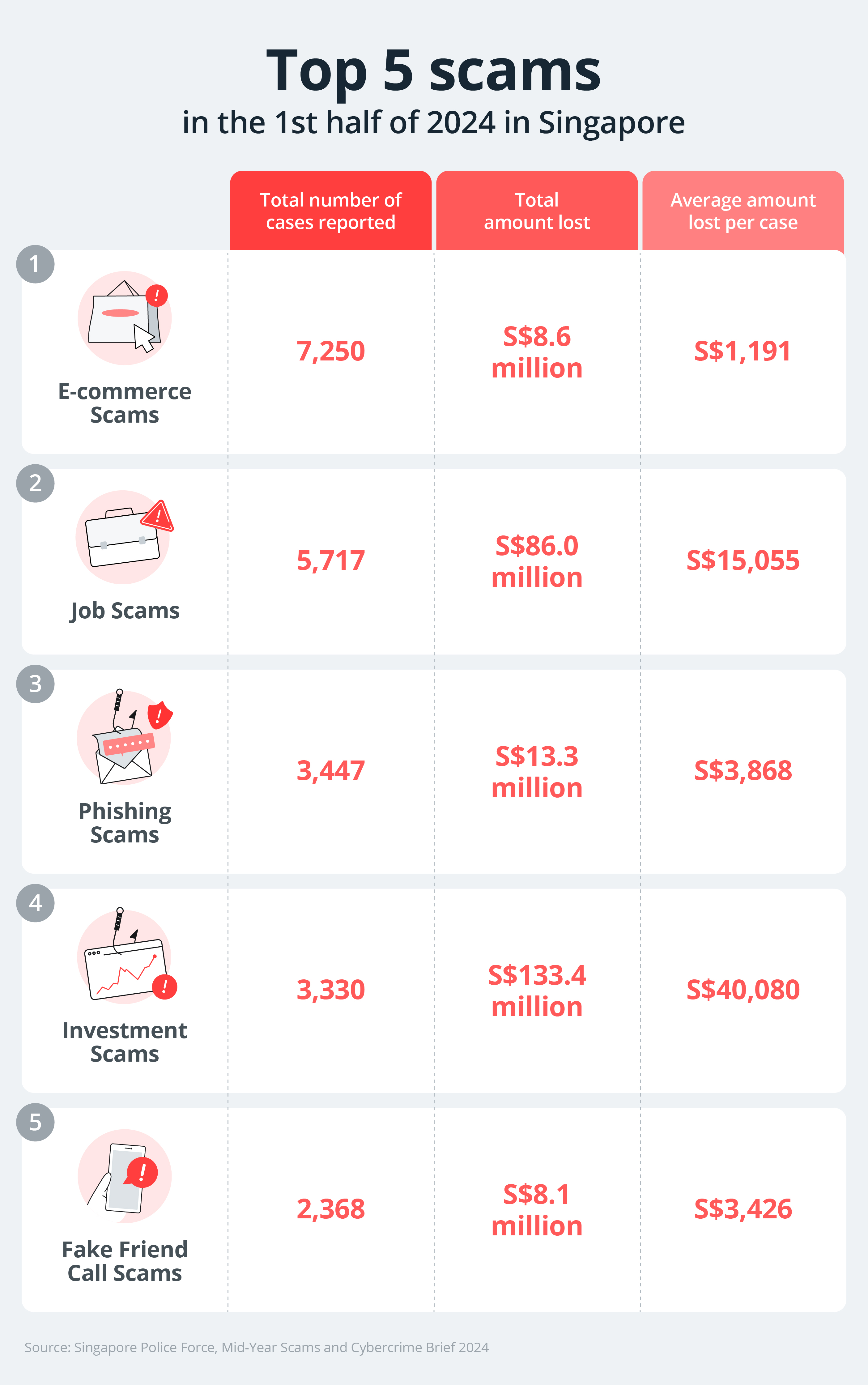Detecting and avoiding investment scams
![]()
If you’ve only got a minute:
- A skilled scammer can play on your psychological biases and effectively cloud your judgement, making you believe that what they tell you is real.
- Be wary of investments that promise high returns at little or no risk, offer referral commissions, or pressure you into making hasty decisions.
- Verify if a company is regulated by checking against resources provided by MAS.
- Add security features, Check for red flags, and Tell authorities (ACT), to protect yourself against scams.
![]()
Technology has undeniably transformed our lives, bringing convenience and access to information like never before.
While we embrace online shopping, banking, communication, and even dating, this increased time spent online also exposes us to a heightened risk of falling prey to scammers.
Investment scams are a growing concern in Singapore, where it ranks among the 5 most common types of scams with 3,330 reported cases that amounted to a staggering total loss of S$133.4 million in the first half of 2024.
This loss amount generated by investment scams is the highest among the list of scams here. The top 5 scam types by case count were e-commerce scams, job scams, phishing scams, investment scams and fake friend call scams.

“It won’t happen to me”
Optimism bias, which is an intrinsic human tendency to overestimate the likelihood of positive events and underestimate the likelihood of negative events, can lead many of us to believe that falling prey to a scam won’t happen to us.
Scammers don't discriminate — they prey on anyone, regardless of their financial or educational background. Stay vigilant as complacency or a misplaced trust can leave you vulnerable.
The Envy Global Investment fraud case, a S$1.5 billion nickel trading scam likely to be the biggest Ponzi scheme in Singapore’s history, is a prime example of this.
Investors were swindled into lending money to the company for a bogus trading scheme which promised returns averaging 15% over a 3-month investment period through investments into nickel.
Documents and videos were forged to show nickel trades which in reality were non-existent. Instead, the funds were transferred to the perpetrator’s personal bank account to fund his lavish lifestyle.
The victims of this case included prominent members of the financial and legal community, coming as a shock to many.
How investment scams work
It's a common reality that scammers are everywhere. And while we are all aware of this, even the best of us fall prey. Why is this so?
Scammers aim to trick you into giving them your money or in the case of phishing scams, your personal information. Be wary, because skilled scammers can be so convincing that they can effectively cloud your judgement, making you believe that what they tell you is real.
They rely on social engineering tactics to psychologically manipulate their targets. This plays on natural human emotions like fear, greed, willingness to trust, or even a need to belong.
In the case of investment scams, they might promise you high and risk-free returns on an investment, positioning the deal to make you feel like you’ll be a fool for missing out on a “once-in-a-lifetime” opportunity.
Read more: How to stay protected from online scams

Common contact methods and approaches
According to the Mid-Year Scams and Cybercrime Brief 2024 published by the Singapore Police Force (SPF), Telegram, Facebook and WhatsApp were the most common platforms used by investment scammers.
Investment scammers often use these 2 approaches to contact their victims.
1. Through messaging platforms
Scammers make use of chatgroups or channels on platforms like WhatsApp, Telegram, and WeChat to promote “investment opportunities”. Often, these are marketed as “limited time offers” to entice potential victims to make rushed decisions in order to get a good deal.
To convince potential victims, these groups often employ a tactic of fake testimonials, showcasing fabricated investment gains to make their scheme seem credible and tested.
They might also create fake websites that appear to show a history of successful investments, even though the data is entirely fabricated.
2. Through befriending
Here, scammers befriend their potential victims through social media platforms and/or dating applications, taking time to build rapport and trust before recommending them investment opportunities.
With a “friendship” struck, victims may believe that the investment is real and transfer their money to specified bank accounts or PayNow numbers. Often, the scammer provides some small profits initially to further convince the victim that it is a good investment, and to put in more money.

Spotting the red flags
Understanding how scammers try to cheat you can help you be alert in spotting a scam early and avoid falling prey to fraudsters.
Here are 5 red flags to look out for that should set alarm bells ringing in your head.
Being able to identify red flags is crucial in avoiding scams, but banks also play a vital role in fighting fraud. The DBS Fraud prevention team is leveraging technology and human expertise to safeguard customers from investment scams. Find out how DBS is tackling financial scams in this Straits Times article.
1. High returns with little or no risk
Financial fraudsters understand what appeals to people: maximum returns with minimum costs. As such, investment scams often promise lucrative returns to lure investors in.
When it comes to investing, there is always a risk-return tradeoff. The higher the promised returns, the higher the risk involved usually is. Similarly, be wary of investment schemes that claim to “guarantee” or “protect” your capital while promising attractive returns.
Do your due diligence to understand the mechanics behind the investment, how the potential returns are being generated, and compare the risk levels against investments which offer similar returns.
At the end of the day, if an investment opportunity sounds too good to be true, it likely is.
Read more: Discipline, time, and patience in investing
2. Referral commissions
Bona fide investment schemes generally do not offer commissions to investors for referrals.
Investment scams tend to offer these to incentivise existing customers to bring in their contacts so they can widen their investor base and funds acquired in a short span of time.
3. Pressure tactics
These come in the form of time-sensitive or limited-availability offers, in hopes of rushing victims into making a hasty and fear induced financial decision.
Give yourself sufficient time to do your research and think through the offer rationally. If in doubt, it is safer to walk away with your wallet intact than to risk falling prey to a scam that could be avoided.
4. Fabricated track records
Investment scams often make claims to be successful, showing years of reliable track record and impressive profits, to gain your trust and make you lower your guard. Many also have fake “satisfied customer” testimonials to boost their credibility.
Remember that with the available technology, fabricating documents or writing reviews can be done in a few easy clicks. It is always advisable to approach such claims with a healthy dose of scepticism, choosing to cross check their authenticity against verifiable sources before making any decisions.
5. Claims to be regulated
The Monetary Authority of Singapore (MAS) provides safeguards to investors by way of the laws they administer. These laws apply to companies and financial institutions which are regulated by MAS, requiring them to disclose information on investment products being recommended to investors.
Some investment scams make false claims to be regulated by the relevant authorities in a bid to gain your trust. The onus is on you to verify such claims against resources provided by MAS, namely the Financial Institutions Directory, Register of Representatives, and Investor Alert List.
If you choose to deal with an unregulated company, you are giving up the safeguards offered by MAS.
Passivity is passé, ACT now!
Use the acronym, ACT to help you remember these precautionary measures to protect yourself against scams.

Add
Add the ScamShield app, and other security features to your device(s).
This includes setting up transaction limits, enabling 2-factor authentication (2FA), enhancing your privacy settings on your social media accounts, and setting strong passwords.
You can also make use of DBS digiVault to lock up your funds and prevent any unauthorised transfers, while still earning your existing interest rate on it.
Read more: 6 online banking safety tips
Find out more about: DBS digiVault
Check
Check for red flags and potential signs of scams with official sources or websites like MAS, Singapore Police Force, and Scam Alert.
It is also good to seek a second opinion from a trusted source if you are unsure about an investment, and do not hesitate to ask as much as needed to fully understand how it works before making any decisions.
Tell
Tell authorities if you encounter a scam and share the latest scam alerts with your friends and family. Report any fraudulent transactions to the police and your bank immediately.
In summary
Familiarise yourself with the red flags of investment scams so you are well equipped to spot one early and avoid becoming a victim.
Remember that investing is a long-term journey, not a get-rich-quick scheme. If an offer sounds too good to be true, it probably is. Do take a moment to pause and think and do any necessary research before making any decisions.
When in doubt, it is better to walk away than to rush into any investment.
Ready to start?
Need help selecting an investment? Try ‘Make Your Money Work Harder’ on digibank to receive specific investment picks based on your objectives, risk profile and preferences.
Invest with DBS Invest with POSB
Speak to the Wealth Planning Manager today for a financial health check and how you can better plan your finances.
Sources:
DBS Bank, “Dear Victim: Understanding the psychology behind scams”, retrieved 13 Sep 2024.
National University of Singapore, “As scams get more sophisticated, young and digitally savvy individuals are more likely to fall prey”, retrieved 13 Sep 2024.
Singapore Police Force, “Mid-Year Scams and Cybercrime Brief 2024”, retrieved 13 Sep 2024.
Singapore Police Force, “Police advisory on investment scams”, retrieved 13 Sep 2024.
The Straits Times, “Liquidators seeking to recover $855m from alleged nickel trading scammer Ng and three others”, retrieved 13 Sep 2024.
The Business Times, “Envy director charged with fraud; at least S$1b invested in his 2 firms”, retrieved 13 Sep 2024.
Disclaimers and Important Notice
This article is meant for information only and should not be relied upon as financial advice. Before making any decision to buy, sell or hold any investment or insurance product, you should seek advice from a financial adviser regarding its suitability.
All investments come with risks and you can lose money on your investment. Invest only if you understand and can monitor your investment. Diversify your investments and avoid investing a large portion of your money in a single product issuer.
Disclaimer for Investment and Life Insurance Products








That's great to hear. Anything you'd like to add? (Optional)
We’re sorry to hear that. How can we do better? (Optional)